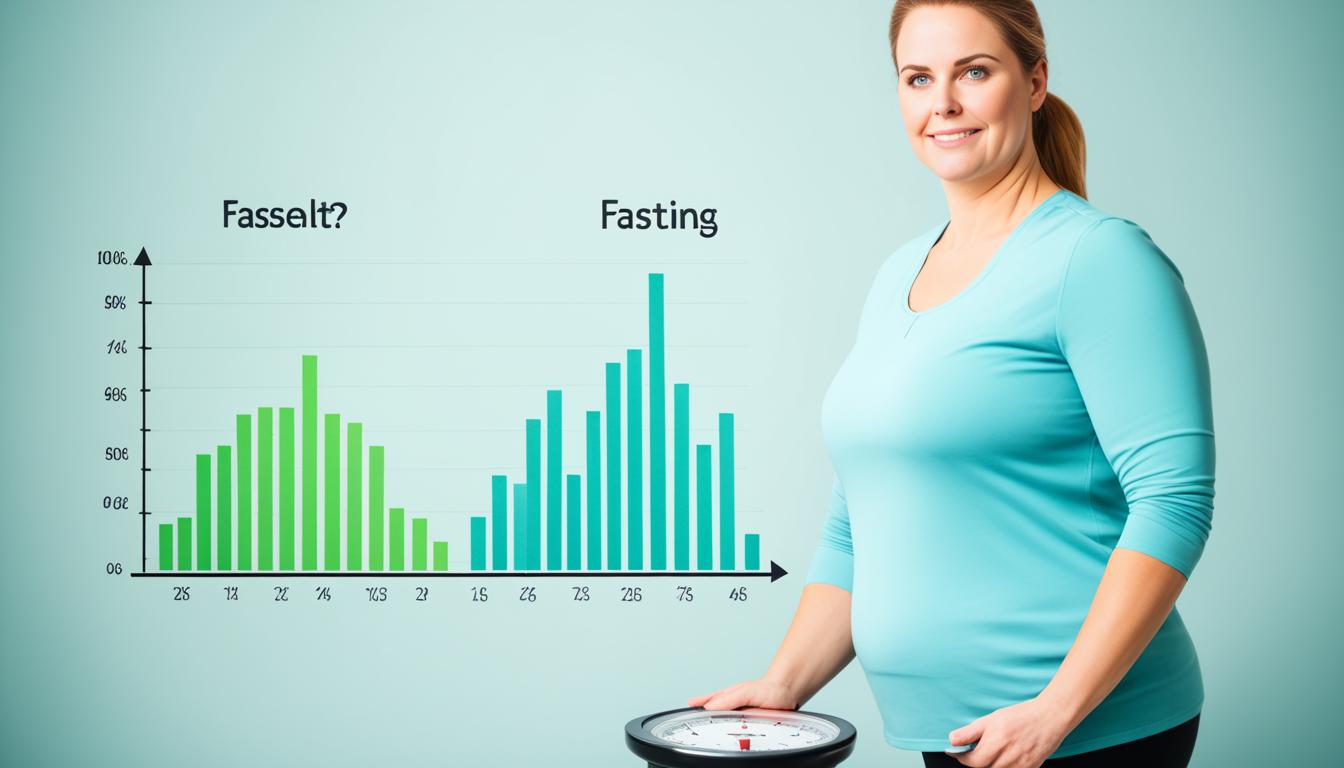Table of Contents
Did you know that intermittent fasting can have a profound impact on your health and wellness? This transformative lifestyle change offers a multitude of benefits, from weight loss to increased energy levels and improved overall well-being. By embracing intermittent fasting, you can kickstart your metabolism, control cravings, achieve your fitness goals, and even enhance longevity.
Key Takeaways:
- Intermittent fasting is a lifestyle change that offers numerous health benefits.
- It jumpstarts your metabolism and boosts energy levels.
- Intermittent fasting can help control cravings and achieve fitness goals.
- It can enhance longevity and provide delicious meals while still optimizing health.
- Unlock the transformative power of intermittent fasting and experience a healthier, more vibrant you.

What is Intermittent Fasting?
Intermittent fasting is not just another fad diet. It is a sustainable way of eating that involves alternating periods of eating and fasting. This approach has been embraced by millions and is known for its ability to rev up the metabolism, burn fat, boost energy levels, and improve mental clarity. It demystifies the process of intermittent fasting and provides a step-by-step plan for success.
Intermittent fasting focuses on when you eat rather than what you eat. Instead of restricting certain food groups or counting calories, it emphasizes giving your body regular periods of rest from digestion. This allows your body to tap into its fat stores for energy, leading to weight loss and other health benefits.
By incorporating intermittent fasting into your lifestyle, you can achieve sustainable eating habits that are easy to maintain in the long run. Unlike traditional diets that rely on strict rules and restrictions, intermittent fasting offers flexibility and freedom while still helping you achieve your health and wellness goals.
“Intermittent fasting offers a simple solution to a complex problem: How can you get all the health benefits of a restricted calorie diet, just without the constant hunger?” – Dr. Jason Fung, nephrologist and author of “The Obesity Code”.
Whether you’re looking to lose weight, improve your overall health, or simply want to optimize your well-being, intermittent fasting can be a powerful tool in your journey. Let’s explore the various methods and benefits of intermittent fasting and uncover the secrets to a sustainable and healthy eating pattern.
Health Benefits of Intermittent Fasting
Intermittent fasting offers a range of health benefits. By incorporating this eating pattern into your lifestyle, you can experience improved insulin sensitivity, which reduces the risk of type 2 diabetes and obesity. This is achieved by giving your body periods of rest from constant food consumption, allowing the insulin levels in your body to stabilize and work more effectively.
Furthermore, intermittent fasting has positive effects on cardiovascular health. Studies have shown that it can help lower blood pressure and cholesterol levels, reducing the risk of heart disease and promoting a healthier heart.
In addition to its benefits for insulin sensitivity and cardiovascular health, intermittent fasting also positively impacts brain health. It has been found to improve memory and cognitive function, allowing for better concentration and mental clarity. This is due to the increased production of brain-derived neurotrophic factor (BDNF), a protein that supports the growth and survival of brain cells.
Moreover, if you are looking to achieve weight loss, intermittent fasting can be a valuable tool. By reducing overall calorie intake, the fasting periods help create a calorie deficit, leading to weight loss over time. It also promotes fat burning by forcing the body to use stored fat as fuel when in a fasted state.
Overall, intermittent fasting offers a wide range of health benefits, including improved insulin sensitivity, cardiovascular health, brain health, and weight loss. This eating pattern can be a powerful strategy to support your overall health and well-being, while also helping you achieve your fitness goals.
Different Methods of Intermittent Fasting
When it comes to intermittent fasting, there are several methods to choose from, each with its own set of rules and guidelines. Whether you prefer a shorter fasting window or a more flexible approach, there’s a method that can fit your lifestyle and goals. Here are some popular intermittent fasting methods:
1. 16/8 Method:
The 16/8 method involves fasting for 16 hours and eating during an 8-hour window. This method is often considered more sustainable because it allows for three meals a day. For example, you may choose to fast from 8 PM to 12 PM the next day and eat from 12 PM to 8 PM. The 16/8 method is flexible and can easily be adjusted to fit your schedule.
2. 5:2 Diet:
The 5:2 diet involves eating normally for five days and restricting calorie intake for two non-consecutive days. On fasting days, you consume around 500-600 calories. The remaining five days, you eat a balanced diet without any calorie restrictions. This method provides more flexibility in terms of when you choose to fast.
3. Eat-Stop-Eat Method:
The eat-stop-eat method involves fasting for 24 hours once or twice a week. For example, you might fast from dinner one day to dinner the next day. It’s essential to stay hydrated during the fasting period and choose nutrient-dense meals on non-fasting days to ensure you meet your nutritional needs.
4. Alternate-Day Fasting:
Alternate-day fasting involves alternating days of normal eating with days of fasting. On fasting days, you consume little to no calories. This method is more restrictive but can be an effective way to kickstart weight loss. It’s important to listen to your body and modify the fasting duration and calorie intake based on your needs and comfort level.
Remember, the most crucial aspect of intermittent fasting is finding a method that works best for you and your lifestyle. Experiment with different approaches and adjust as needed to achieve optimal results.
Starting Intermittent Fasting as a Beginner
If you’re new to intermittent fasting, it’s important to start slow and choose a method that feels manageable for your lifestyle and schedule. Easing into fasting is key to ensuring long-term success and sustainability. Instead of diving headfirst into an aggressive fasting routine, consider starting with the 16/8 method, a popular choice for beginners.
| Intermittent Fasting Method | Description |
|---|---|
| 16/8 method | Fast for 16 hours and eat during an 8-hour window |
The 16/8 method is relatively easy to fit into a busy schedule and still allows for three meals a day. It provides flexibility while still reaping the benefits of intermittent fasting. With this method, you can start your fasting period in the evening and skip breakfast in the morning, breaking your fast at lunchtime.
To ease into fasting gradually, consider starting with shorter fasting periods, such as 12 hours, and gradually increase the duration as your body adapts. This approach allows your body to adjust to the fasting state and minimizes the chances of feeling hungry or fatigued.
Listening to your body is crucial during intermittent fasting. If you feel excessively hungry or experience any negative side effects, it’s important to adjust your fasting window or seek guidance from a healthcare professional.
Staying hydrated is essential while fasting. Aim to drink plenty of water throughout the day to avoid dehydration and support your body’s natural processes.
During the eating periods of intermittent fasting, focus on consuming nutrient-dense foods to meet your body’s nutritional needs. Incorporate a balance of macronutrients and include a variety of fruits, vegetables, lean proteins, and healthy fats.

Easing into intermittent fasting as a beginner and choosing a manageable method that aligns with your lifestyle are key steps toward achieving success with this dietary approach. By starting slow, listening to your body, and nourishing it with nutrient-dense foods, you can embark on a sustainable journey of intermittent fasting and unlock its transformative health benefits.
Consult with a Healthcare Professional
Before starting intermittent fasting, it is always advisable to consult with a healthcare professional, especially if you have underlying health conditions such as type 1 diabetes or a history of eating disorders. Pregnant or breastfeeding women should also seek medical advice. A healthcare professional can provide proper guidance and ensure that intermittent fasting is safe and suitable for your individual needs.
Talking to a Doctor for Proper Medical Advice
Intermittent fasting is a dietary approach that may have varying effects on different individuals, depending on their unique health circumstances. Consulting with a doctor is particularly crucial if you have any underlying health conditions or concerns.
The guidance of a healthcare professional is essential, as they can offer personalized advice based on your medical history, current health state, and individual needs.
A doctor will assess whether intermittent fasting is appropriate for you and may provide recommendations for modifications or adjustments to ensure your safety. They can also help you understand potential risks, benefits, and any necessary precautions to consider.
Remember, a healthcare professional’s expertise can provide you with valuable insights and help you make informed decisions about your health.
The Importance of Proper Medical Advice
It is crucial to consult with a doctor because intermittent fasting can impact various aspects of your health, such as blood sugar levels, hormone regulation, and metabolism. This becomes even more important if you have a pre-existing condition that requires careful management or a history of disordered eating habits.
By seeking proper medical advice, you can ensure that your intermittent fasting journey aligns with your specific health goals and does not pose any risks or complications.
Consultation for Underlying Health Conditions
If you have underlying health conditions, it is essential to consult with a healthcare professional before embarking on an intermittent fasting regimen.
For example, individuals with type 1 diabetes may require careful monitoring of blood glucose levels and adjustments to medication doses during fasting periods. Pregnant or breastfeeding women have specific nutritional requirements and should seek guidance on how to balance intermittent fasting with meeting those needs.
Consulting with a healthcare professional can address these concerns and ensure that your intermittent fasting plan is tailored to your specific circumstances and remains safe and effective.
Building a Supportive Healthcare Team
A healthcare professional, such as a doctor or registered dietitian, can be a valuable resource throughout your intermittent fasting journey. They can monitor your progress, provide additional guidance, and address any concerns that arise along the way.
Remember, everyone’s health journey is unique, and receiving proper medical advice will help you navigate intermittent fasting in a way that supports your overall well-being.
| Key Points |
|---|
| Consult with a healthcare professional before starting intermittent fasting, especially if you have underlying health conditions or concerns. |
| Proper medical advice is crucial to ensure that intermittent fasting is safe and suitable for your individual needs. |
| If you have type 1 diabetes, a history of eating disorders, or are pregnant or breastfeeding, it is especially important to consult with a healthcare professional. |
| A healthcare professional can provide personalized guidance, assess potential risks, and help you navigate intermittent fasting while considering your health circumstances. |

Incorporating intermittent fasting into your lifestyle can be a positive step towards improving your overall health. However, it is essential to prioritize your well-being and seek proper medical advice. By consulting with a healthcare professional, you can ensure that intermittent fasting is safe, suitable, and aligned with your individual health needs.
The Science-Backed Benefits of Intermittent Fasting
Intermittent fasting offers a multitude of science-backed benefits that can revolutionize your health and well-being. Research and expert opinions in the field support the following advantages:
1. Improved Metabolic Health
Intermittent fasting has been shown to improve metabolic health by enhancing insulin sensitivity, promoting efficient energy utilization, and aiding in weight management.
2. Enhanced Heart Health
Studies suggest that intermittent fasting can help lower blood pressure, reduce cholesterol levels, and decrease the risk of heart diseases, thus contributing to better cardiovascular health.
3. Weight Loss
Intermittent fasting has gained popularity as a weight loss strategy. By reducing calorie intake and promoting fat burning, it can aid in achieving and maintaining a healthy weight.
4. Improved Athletic Performance
Athletes and fitness enthusiasts often turn to intermittent fasting to optimize their performance. The body’s adaptation to fasting can enhance endurance, muscle preservation, and overall athletic capabilities.
5. Reduced Inflammation
Chronic inflammation is linked to various health issues, including obesity, heart disease, and autoimmune disorders. Intermittent fasting has been found to reduce inflammation markers in the body, promoting better overall health.
6. Improved Brain Function
Intermittent fasting has shown promising effects on brain health, including improved cognitive function, memory, and neuroplasticity. It may also help protect against neurodegenerative diseases like Alzheimer’s.
7. Better Gut Health
The gut microbiome plays a crucial role in overall health. Intermittent fasting has been found to promote a healthy gut microbiome, supporting digestion, nutrient absorption, and immune function.
8. Cellular Repair and Increased Resilience
During fasting periods, the body initiates autophagy, a cellular repair process that removes damaged cells and promotes rejuvenation. This heightened resilience helps protect against age-related diseases and supports longevity.

Intermittent fasting offers a range of scientifically proven benefits. From improved metabolic health and heart function to weight loss, enhanced athletic performance, reduced inflammation, improved brain function, better gut health, and increased cellular repair, intermittent fasting can transform your well-being and resilience.
Incorporating Intermittent Fasting into Your Lifestyle
When it comes to incorporating intermittent fasting into your lifestyle, it’s essential to approach it with care and consideration. By choosing the right approach and understanding your individual response to fasting, you can optimize your experience and maximize the potential health benefits.
- Start Slowly: Begin by gradually introducing intermittent fasting into your routine. This allows your body to adjust to the new eating pattern and minimizes the risk of potential side effects.
- Choose the Right Approach: There are various intermittent fasting patterns to choose from, such as the 16/8 method, alternate-day fasting, or the 5:2 diet. Consider your lifestyle, preferences, and goals when selecting the fasting pattern that works best for you.
- Listen to Your Body: Pay attention to how your body responds to intermittent fasting. Some individuals may thrive on longer fasting periods, while others may find shorter periods more suitable. Adjust your fasting window and eating schedule based on your body’s signals and needs.
- Consult with a Healthcare Professional: If you have any underlying health conditions or concerns, it’s advisable to seek guidance from a healthcare professional before embarking on an intermittent fasting journey. They can provide personalized advice based on your individual needs and help ensure that intermittent fasting is safe for you.
Remember, intermittent fasting is not a one-size-fits-all approach. It’s important to find a fasting pattern and schedule that works best for your body and lifestyle. By incorporating intermittent fasting into your routine mindfully, you can unlock the potential health benefits and achieve your wellness goals.

Importance of Proper Nutrition during Eating Periods
During the eating periods of intermittent fasting, it’s essential to focus on consuming nutrient-dense foods and maintaining balanced meals. This ensures that you meet your nutritional needs and support overall health and well-being.
When it comes to nutrient-dense foods, aim for a variety of fruits and vegetables, lean proteins, whole grains, and healthy fats. These foods are packed with essential nutrients, vitamins, and minerals that your body needs to function optimally.
By incorporating nutrient-dense foods into your meals, you can fuel your body with the necessary building blocks for growth, repair, and overall wellness. They provide sustained energy and help keep you feeling full and satisfied throughout the day.
It’s also important to focus on balanced meals that include a combination of carbohydrates, proteins, and fats. This helps maintain stable blood sugar levels, supports proper digestion, and provides a steady supply of energy.
Additionally, drinking plenty of water is crucial during eating periods. Staying hydrated supports proper bodily functions, aids digestion, and helps regulate appetite.
Choosing whole, unprocessed foods is key to meeting your nutritional needs during intermittent fasting. These foods provide high-quality nutrients without added sugars, unhealthy fats, or artificial ingredients.
“Eating nutrient-dense foods during intermittent fasting is like fueling your body with premium quality gasoline. It helps promote optimal functioning and keeps you feeling your best.” – Dr. Jane Miller, Registered Dietitian
Benefits of Nutrient-Dense Foods and Balanced Meals during Intermittent Fasting:
| Benefit | Description |
|---|---|
| Meeting Nutritional Needs | Nutrient-dense foods provide essential vitamins, minerals, and antioxidants that support overall health and well-being. |
| Improved Energy Levels | Consuming balanced meals ensures a steady release of energy throughout the day, preventing energy crashes and promoting sustained focus and productivity. |
| Weight Management | Nutrient-dense foods and balanced meals help regulate appetite, control cravings, and support healthy weight loss or maintenance goals. |
| Optimal Digestion | Proper nutrition promotes healthy digestion, reduces discomfort, and supports the absorption of nutrients from the food you consume. |
| Enhanced Overall Health | Nutrient-dense foods and balanced meals provide the necessary nutrients to support immune function, cardiovascular health, and other bodily systems. |
Remember, intermittent fasting is not an excuse to indulge in unhealthy foods during eating periods. It’s an opportunity to nourish your body with wholesome ingredients that support your health and fitness goals.
Unlocking the Power of Intermittent Fasting
Incorporating intermittent fasting into your routine can unlock the power of this approach and help you optimize your health, promote longevity, and enhance overall well-being. By experiencing the various science-backed benefits, such as improved metabolic health, heart function, weight loss, athletic performance, reduced inflammation, improved brain function, better gut health, and cellular repair, you can transform your life and become a healthier and more vibrant version of yourself.
Intermittent fasting is not just a passing trend but a proven strategy with significant impacts on your well-being. It has been extensively studied and documented, offering substantial benefits to those who practice it. The science-backed benefits go beyond just weight loss, extending to multiple aspects of your health and bodily functions.
Improved Metabolic Health
One of the key benefits of intermittent fasting is its positive impact on metabolic health. Research has shown that intermittent fasting can enhance insulin sensitivity, which is crucial for regulating blood sugar levels and preventing conditions like type 2 diabetes and obesity. This improved insulin response helps your body efficiently convert nutrients into energy, leading to better overall metabolic health.
Enhanced Heart Function
The cardiovascular benefits of intermittent fasting are well-established. It can help lower blood pressure and cholesterol levels, reducing the risk of heart disease and other cardiovascular conditions. By giving your heart a rest from continuous digesting and processing of food, you allow it to focus on healing and preventing potential damage to your cardiovascular system.
Weight Loss and Body Composition
Intermittent fasting promotes weight loss and improved body composition by creating a calorie deficit and increasing fat-burning mechanisms. By alternating periods of fasting and eating, your body taps into stored fat for energy, leading to gradual and sustainable weight loss. It also helps preserve lean muscle mass, ensuring that the weight loss comes mainly from fat, not muscle. Additionally, intermittent fasting can reduce cravings and binge eating, making it easier to stick to a healthy eating pattern and achieve your weight loss goals.
Enhanced Athletic Performance
Intermittent fasting can boost athletic performance by improving energy utilization, promoting fat adaptation, and increasing the production of growth hormone. When your body becomes more efficient at burning fat for fuel during fasting periods, you can sustain energy levels for longer periods. This can enhance endurance performance and support high-intensity training. Furthermore, intermittent fasting has been shown to stimulate the production of growth hormone, which aids in muscle growth, recovery, and repair.
Reduced Inflammation
Inflammation is a natural response in the body, but chronic inflammation can contribute to various health issues, such as cardiovascular disease, diabetes, and autoimmune conditions. Intermittent fasting has been shown to reduce markers of inflammation in the body, promoting overall health and preventing chronic diseases. By giving your body regular periods of fasting, you give it the chance to focus on inflammation reduction and cellular repair.
Improved Brain Function
Intermittent fasting has shown promising effects on brain health and cognitive function. It promotes the production of brain-derived neurotrophic factor (BDNF), a protein that supports the growth and maintenance of brain cells. By increasing BDNF levels, intermittent fasting can improve memory, concentration, and overall brain function. It has also been linked to a reduced risk of age-related cognitive decline, such as Alzheimer’s disease.
Better Gut Health
Your gut health plays a crucial role in overall well-being, as it affects digestion, nutrient absorption, and immune function. Intermittent fasting can improve gut health by giving your digestive system regular rest periods and allowing your gut microbiome to rebalance. By reducing the frequency of meals and potentially eliminating late-night snacking, intermittent fasting can positively impact your gut microbiota and support a healthy digestive system.
Cellular Repair and Increased Resilience
Intermittent fasting triggers a process called autophagy, which is the body’s way of clearing out damaged cells and cellular debris. This cellular repair mechanism helps improve overall cellular function and longevity. By regularly engaging in intermittent fasting, you activate autophagy, allowing your cells to repair and regenerate, leading to increased resilience and overall health.
Through the science-backed benefits of intermittent fasting, you can optimize your health, improve your body’s functioning, and promote longevity. By adopting this lifestyle approach, you can experience improved metabolic health, enhanced heart function, weight loss, athletic performance, reduced inflammation, improved brain function, better gut health, cellular repair, and increased resilience.
Consult with a Healthcare Professional
Before embarking on your intermittent fasting journey, it is of utmost importance to consult with a healthcare professional. The guidance of a doctor or medical expert can provide personalized advice based on your individual needs and ensure that intermittent fasting is safe and suitable for you.
Everyone’s body is unique, and factors such as underlying health conditions, medications, and lifestyle can influence how your body responds to intermittent fasting. By seeking proper medical advice, you can address any concerns, gain a clear understanding of how intermittent fasting may affect you, and create a plan that aligns with your specific circumstances.
Healthcare professionals have the expertise to evaluate your overall health and identify any potential risks or adjustments that may be necessary before starting intermittent fasting. They can help you navigate through any complications that may arise and provide helpful strategies to optimize your intermittent fasting experience.
Consulting with a doctor also ensures that intermittent fasting complements any existing treatments or medications you may be taking. It allows you to understand if adjustments need to be made or if intermittent fasting may interfere with your current healthcare plan.
Ultimately, seeking proper medical advice before embarking on intermittent fasting will empower you to make informed decisions and prioritize your health. Your doctor can help you tailor your approach to intermittent fasting, taking into account your specific goals, lifestyle, and individual needs.
Remember, the journey towards health and well-being is best undertaken with professional guidance. Consult with a healthcare professional to ensure that your intermittent fasting journey is safe, effective, and tailored to your unique circumstances.
Additional Resources and Expert Opinions
For those eager to delve deeper into the world of intermittent fasting, there is a wealth of resources available. Whether you prefer books, podcasts, or articles, these resources offer in-depth information and guidance to enhance your understanding and success with intermittent fasting.
If you’re looking for expert opinions and personalized guidance, it’s highly recommended to consult with health professionals such as doctors, nutritionists, or registered dietitians. These experts can provide valuable insights based on their extensive knowledge and experience, ensuring your intermittent fasting journey aligns with your specific needs and goals.
Top Intermittent Fasting Resources:
- The Obesity Code: Unlocking the Secrets of Weight Loss by Dr. Jason Fung
- Delay, Don’t Deny: Living an Intermittent Fasting Lifestyle by Gin Stephens
- The Complete Guide to Fasting: Heal Your Body Through Intermittent, Alternate-Day, and Extended Fasting by Dr. Jason Fung and Jimmy Moore
“Intermittent fasting provides a fresh perspective on the benefits of time-restricted eating and offers a sustainable approach to improving overall health and wellness.” – Dr. Sarah Thompson, MD
Expert Opinions:
Health professionals from various fields have shared their expert opinions on intermittent fasting:
| Name | Title | Opinion |
|---|---|---|
| Dr. Mark Mattson | Neuroscientist | “Intermittent fasting has shown promise in improving brain health and protecting against age-related neurodegenerative diseases.” |
| Dr. Valter Longo | Director of the Longevity Institute | “Intermittent fasting has the potential to promote longevity and increase overall healthspan.” |
| Nicole Osinga, RD | Registered Dietitian | “Intermittent fasting can be an effective tool for weight management and improving metabolic health when done correctly and with guidance.” |
These expert opinions provide valuable insights into the benefits and efficacy of intermittent fasting, reinforcing its potential as a transformative lifestyle choice. By utilizing the expertise of health professionals and exploring reputable resources, you can embark on your intermittent fasting journey with confidence and maximize the positive impact on your health and well-being.
Conclusion
Intermittent fasting is a powerful tool for improving overall health and preventing chronic diseases. By incorporating intermittent fasting into your lifestyle, you can experience numerous health benefits. Studies have shown that intermittent fasting can improve metabolic health, enhance heart function, aid in weight loss, boost athletic performance, reduce inflammation, improve brain function, promote better gut health, facilitate cellular repair, increase resilience, and enhance stress resistance.
However, before starting intermittent fasting, it is crucial to consult with a healthcare professional. This is especially important if you have underlying health conditions or if you are pregnant or breastfeeding. A healthcare professional can provide personalized guidance based on your individual needs and ensure that intermittent fasting is safe and suitable for you. They can also help you create a plan to get all the necessary nutrients during the eating periods of your fasting routine.
By taking the necessary precautions and seeking proper medical advice, you can unlock the transformative benefits of intermittent fasting and embark on a journey to a healthier, more vibrant you. So consult with a healthcare professional today and discover how intermittent fasting can optimize your overall health and well-being.
The Ultimate Guide no. 1 to Keto diet : Transform Your Body with the Ketogenic Diet
Essential Vitamins and Minerals Supplements Guide : for better health channel
FAQ
What is intermittent fasting?
What are the health benefits of intermittent fasting?
What are the different methods of intermittent fasting?
How do I start intermittent fasting as a beginner?
Should I consult with a healthcare professional before starting intermittent fasting?
What are the science-backed benefits of intermittent fasting?
How do I incorporate intermittent fasting into my lifestyle?
What should I eat during eating periods of intermittent fasting?
How can I unlock the power of intermittent fasting?
Are there additional resources and expert opinions on intermittent fasting?
Do I need to consult with a healthcare professional before starting intermittent fasting?
What are the overall benefits of intermittent fasting?
Source Links
- https://www.thehealingduo.com/blog/unlocking-the-health-benefits-of-intermittent-fasting-a-beginner-s-guide
- https://www.barnesandnoble.com/w/unlock-health-with-intermittent-fasting-for-beginners-clarence-h-welker/1144324410
- https://gobitcare.com/unlocking-the-health-benefits-of-intermittent-fasting-a-guide-to-a-transformative-lifestyle/

